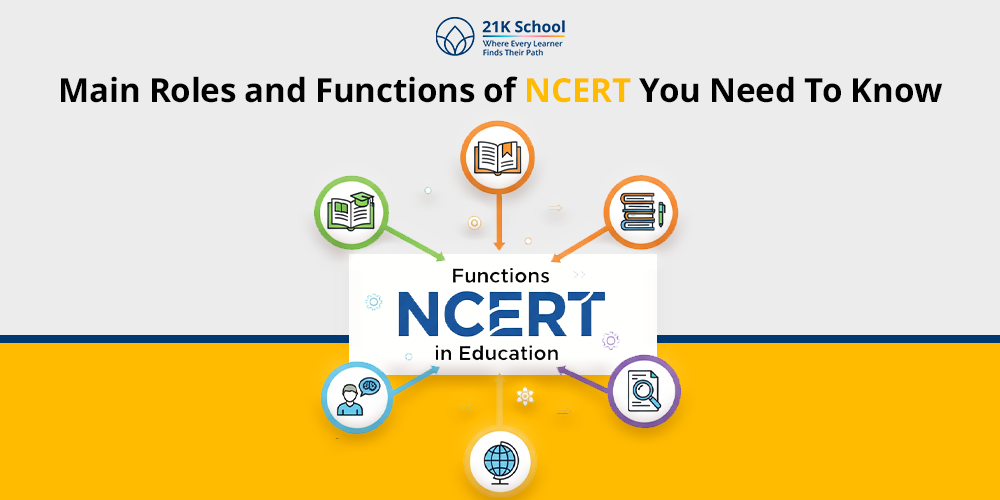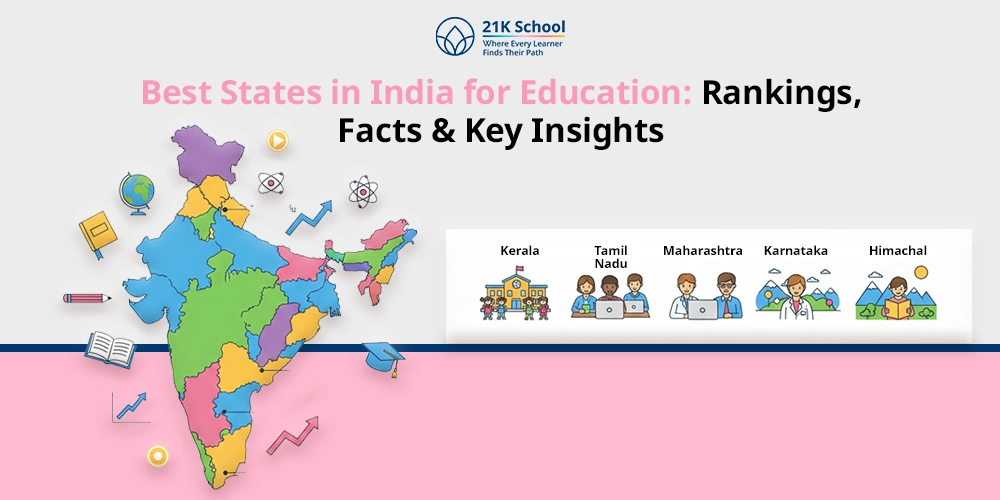
We have been very familiar with the term NCERT from our childhood, since we knew about boards exams, and NCERT books.
You might remember how our teachers told us that NCERT was our Bible for board exams and we need to revise it continuously.
Well, is it all that NCERT does? Why is it so important and well-known in our studies?
This article will introduce you to all the important functions of NCERT , and how it contributes to your education .
Contents
- What is NCERT?
- 12 Functions of NCERT
- 1. Curriculum Development and Planning
- 2. Preparation and Publication of Textbooks
- 3. Offering Digital Content
- 4. Educational Research and Innovation
- 5. Teacher Education and Professional Development
- 6. Educational Evaluation and Assessment
- 7. Educational Extension and Outreach
- 8. Collaboration and Advisory Role to Government
- 9. Publication and Dissemination of Knowledge
- 10. Events Organization
- 11. Supporting universalization of education
- 12. Ensuring Overall Development
- Importance of NCERT in the Indian Education System
- Conclusion
What is NCERT?
National Council of Educational Research and Training (NCERT) is the highest-level organization that was started by the government of India in order to facilitate quality enhancement of school education.
It serves as a center of educational research, training of teachers, innovation and curriculum development.
NCERT is also closely working with other state education boards, universities and other national agencies. Such as CBSE (Central Board of Secondary Education), SCERTs (State Councils of Educational Research and Training) and NIOS (National Institute of Open Schooling) in ensuring the same standards of education in the country.
The mission of NCERT is to offer education which encourages the growth of intellect, emotion, social and moral facets in the learners as a way of preparing them to confront the challenges of the dynamic world.
12 Functions of NCERT
The main functions of NCERT that revolves around student education and their overall academic development are as:
1. Curriculum Development and Planning
Designing and revision of school curriculum at all levels of education (primary to senior secondary) form one of the major roles of NCERT .
The body also comes up with the National Curriculum Framework (NCF) that serves as a guide to all educational boards and institutions.
This incorporates identifying emerging needs, integrating new developments, and introducing innovations, global changes, and national interests, such as sustainability, inclusion, and digital literacy .
NCERT makes sure that the learning curricula are learner oriented, dynamic and accommodating of various cultural and region oriented factors.
2. Preparation and Publication of Textbooks
NCERT is probably most famous for preparing and publishing school textbooks based on the national curriculum in schools belonging to the CBSE and other boards.
These textbooks are conceptually sound, age-appropriate and low priced.
They are updated on a regular basis according to the latest development in different fields.
Other than textbooks, NCERT also publishes reading supplements, teacher guidelines, reference books and journals.
It seeks to bring quality education materials to every student in India.
3. Offering Digital Content
As the education sector continues to rapidly digitalize, NCERT has been able to adopt technology in the form of ePathshala and DIKSHA platforms.
These provide e-learning content in the form of digital textbooks, interaction modules, audio-visual and other e-learning material.
NCERT uses digital content to facilitate self-regulated learning and ensure that quality learning in remote, rural locations is attained.
This online strategy is also useful in sealing the learning gap that could occur due to geographical or economic limitations.
4. Educational Research and Innovation
NCERT undertakes a lot of research regarding school education which includes pedagogy, outcomes of learning, and methods of assessment and inclusive practices.
The departments and constituent entities (such as NIE, RIEs and PSSCIVE) conduct research to enhance classroom instructions, merge with the emerging educational psychology and modify the innovative learning processes.
Such findings of the research are used in the development of policies and programs of national education.
5. Teacher Education and Professional Development
Quality teaching is defined as the primary factor in student achievements.
And NCERT guarantees a well-defined career advancement of the teacher by means of training sessions, workshops, or orientation.
It secures in-service and pre-service training of teachers to boost teaching skills, adoption of technology in instruction as well as foster inclusive education .
NCERT is another institution that works together with SCERTs and DIETs (District Institutes of Education and Training) to provide countrywide enforcement of teacher training standards.
6. Educational Evaluation and Assessment
NCERT advances and enhances student performance and education assessment systems.
It can evaluate the level of learning of students in the various states through programs such as the National Achievement Survey (NAS).
This assists in determining the lapses in the Indian education system .
It also develops structures of both formative and summative evaluation whose purpose is that the evaluation strategies are based on the learning outcomes rather than on memorization.
7. Educational Extension and Outreach
NCERT is able to provide support to the states and union territories by educational outreach programs, workshops, and guidance services.
It helps schools to undertake new education projects and enhance classroom activities.
These activities extensions also entail building resource centers, community-based educations, and efforts geared towards integrating the marginalized children in the mainstream education system.
8. Collaboration and Advisory Role to Government
NCERT as an advisory body is very important in advising the central and state governments with regard to educational policies and reforms.
It is a source of expert advice on the formulation of major initiatives like the National Education Policy (NEP) and it serves to connect research and action.
The council also works with foreign agencies such as UNESCO, UNICEF and World Bank in order to streamline the education system in India to the international standards.
9. Publication and Dissemination of Knowledge
Other than textbooks, NCERT also produces a broad variety of educational resources, journals of research, reports, newsletters and teacher manuals.
It publishes some of its high-selling magazines such as School Science, Indian Educational Review, and The Primary Teacher.
Such materials are circulated throughout the country and they are vital assets to teachers, researchers and policymakers.
10. Events Organization
Educational initiatives, seminars, olympiads and workshops in the region, nationally and internationally are organized by NCERT.
Students and teachers get to present innovation, creativity and research in these events.
An example is the National Talent Search Examination (NTSE) and other programs which promote academic and scientific advancement among young students.
11. Supporting universalization of education
NCERT has been in the forefront to promote activities that seek to ensure that education is made accessible to all children.
It is involved in schemes in Sarva Shiksha Abhiyan (SSA) and Samagra Shiksha, which aim to bring inclusive education, gender equity, and lowering the dropout rate.
NCERT also through its regional centers supports technical and academic assistance to the underdeveloped regions through which it helps all children have an equal opportunity to education.
12. Ensuring Overall Development
Outside the academic circles, NCERT advances whole person development amongst students.
Its frameworks give a high regard to moral values, skills in life, physical education, arts and environmental awareness.
Read about how to raise environmental awareness among young people .
The aim is to breed individuals who are qualified in their academics and also well balanced emotionally, socially responsible, and environmentally conscious citizens.
This is in line with the larger objectives of national development and international peace.
Importance of NCERT in the Indian Education System
NCERT is the foundation of the Indian school system of education. Its impact is vastly more than textbooks, that is how knowledge is developed, delivered and assessed.
- Standardization: NCERT guarantees that there is uniformity in the quality of education in all CBSE and other affiliated schools.
- Availability: Due to cheap textbooks and online learning materials, all socioeconomic groups can now access good learning.
- Innovation: Research-based instructional procedures make classes modern and foster creativity.
- Teacher Empowerment: Teacher training programs improve the standards of teaching in the country.
- International Representation: The international association of NCERT with other world agencies improves the standards of acceptability and suitability of Indian education in the world.
Finally, NCERT furnishes a platform of intellectual and practical basis to progressive, equitable, and learner centred education in India.
Conclusion
The National Council of Educational Research and Training is an apex educational organization to publish textbooks of Indian school education, as one of its many functions.
NCERT plays key roles in setting standards in the curriculum, providing assistance to the teachers, conducting research activities and active encouragement of learning of individuals with disabilities.
This is how NCERT proves that education is relevant, and fair in India.
Its current endeavors are based on the faith that education is about quality.
It is therefore focused on developing responsible, capable, and compassionate learners that can become accountable persons and can make a presence in the society.



